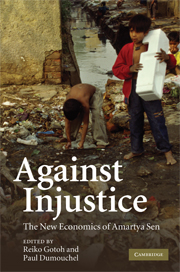Book contents
1 - Economics, law, and ethics
Published online by Cambridge University Press: 18 January 2010
Summary
Introduction
In this presentation, I shall try to comment on the interrelations of economics, ethics and law. I shall argue that these interconnections are deep and complex, and there are good reasons for us to take satisfaction in the fact that these linkages are now receiving more attention than they did in the past. Indeed, this conference at the famous Ritsumeikan University is itself a significant attempt at constructively investigating the ties between these apparently disparate but strongly interlinked subjects. However, along with that “positive” theme, I want to present a somewhat critical reflection as well, to wit, that these interconnections tend sometimes to be inadequately explored, because they do not go deeply enough into the actual nature of the respective disciplines. If the interconnections have to be given their due weight, it is critically important for us to take each subject in an adequately rich form.
Let me illustrate the dual comments I am trying to make by first considering the relation between the two disciplines of economics and law, and the recent emergence of a new subject called “law and economics.” Given their interdependences, we have reason enough to welcome the fact that “law and economics” as a discipline has now become such a standard part of law education in many parts of the world, led by the United States.
- Type
- Chapter
- Information
- Against InjusticeThe New Economics of Amartya Sen, pp. 39 - 54Publisher: Cambridge University PressPrint publication year: 2009
References
- 5
- Cited by



